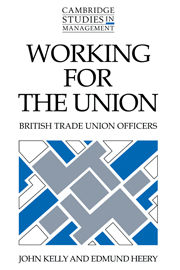Book contents
- Frontmatter
- Contents
- List of figures and tables
- Preface
- List of abbreviations
- Part 1 Introduction
- Part 2 The parameters of union work
- 3 Full-time officer organization
- 4 Employment relations
- 5 Work relations
- Part 3 The full-time officer at work
- Part 4 Conclusions
- Appendix: Research methods
- Notes
- Bibliography
- Index of names
- Index of subjects
- Cambridge Studies in Management
5 - Work relations
Published online by Cambridge University Press: 22 October 2009
- Frontmatter
- Contents
- List of figures and tables
- Preface
- List of abbreviations
- Part 1 Introduction
- Part 2 The parameters of union work
- 3 Full-time officer organization
- 4 Employment relations
- 5 Work relations
- Part 3 The full-time officer at work
- Part 4 Conclusions
- Appendix: Research methods
- Notes
- Bibliography
- Index of names
- Index of subjects
- Cambridge Studies in Management
Summary
Having examined employment relations of full-time officers in chapter 4, the ‘structure of control’ (Littler, 1982: 42) over their work is now examined. We look at the mechanisms trade unions use to guide and monitor the work of officers and hold them to account, estimate the degree of autonomy they exercise at work and review their role as conduits for national union policy. We also examine officers' views of their accountability to lay members and their superiors. Our purpose is the same as in chapter 4. The structure of control over officer work may determine officer behaviour and relations with members, and is therefore deserving of investigation. This can be illustrated by reference to the theoretical models of union officialdom set out in chapter 2. A recurrent theme in the literature on trade union bureaucracy, for example, is the ineffectiveness of member and lay officer control over union ‘bureaucrats’, whose expertise and influence within internal administrative and political systems enable them to set the agenda for union policy (Webb and Webb, 1902, 1920). Less frequently articulated, but derivative from the assumption of tight central control of union organization which is contained in this tradition, is the belief that officers will be subject to fairly strict supervision from their superiors within the hierarchy (cf. Bamber, 1986: 59—62; Lester, 1958: 26—7).
The reverse of this belief, however – that officers have considerable autonomy and the opportunity to order their priorities and activities – lies behind two of the other models described, those emphasizing union polyarchy and the influence of officer values over behaviour.
- Type
- Chapter
- Information
- Working for the UnionBritish Trade Union Officers, pp. 74 - 98Publisher: Cambridge University PressPrint publication year: 1994



